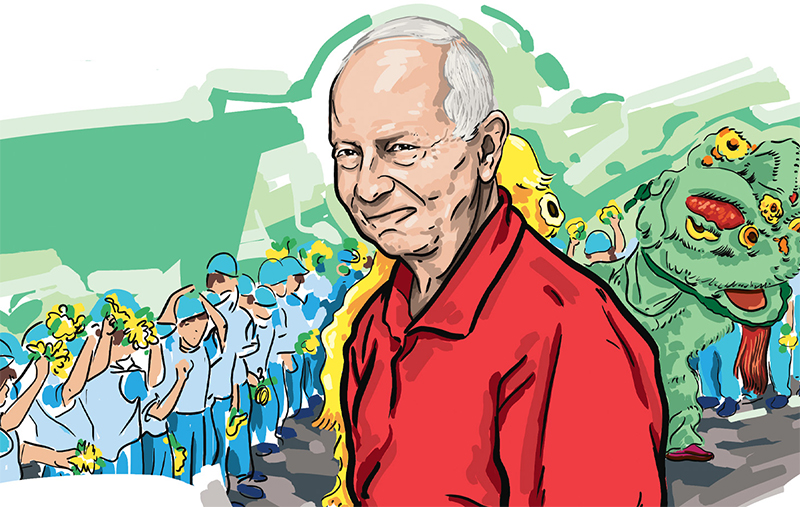Vietnam War Vet Fights Heart Issues

October 23, 2020
Typically, we photograph every patient appearing in HealthU. Because this story was planned during the surge of COVID-19, that contact would have been too risky. Instead, our team took a creative approach and replaced photo shoots with illustrated portraits of patients.
For Howard Goldin, a 72-year-old retired police officer and Vietnam War veteran, finding a doctor isn’t as simple as asking friends or family for a recommendation or reviewing options online. In 1968, Howard was on the ground during the Tet Offensive in South Vietnam, where he was exposed to Agent Orange, an herbicide that was, at the time, thought to be harmless to soldiers and helped them navigate the tall grass and jungles
of Vietnam.
“I became a police officer in 1970, and in 1971, I was diagnosed with hypertension,” Howard says. “My blood pressure kept going up, and doctors weren’t sure why—it wasn’t because of my job. That’s when studies started to be done about the effects of Agent Orange. I developed coronary artery disease, ischemic heart disease and issues with my blood vessels. And being a combat vet, I had post-traumatic stress disorder.”
His health issues, as well as seeing friends who were in combat dying from the effects, sent Howard on a quest to find a doctor who was familiar with Agent Orange. Eventually Howard found his way to Hackensack University Medical Center, where doctors worked with him for years, keeping his heart disease under control, so he could pursue his career and eventually his true calling, being active in the Schools to End Poverty (STEP) program.
Defining a Legacy
In 2005, Howard and a few of his fellow vets decided to return to Vietnam to see the country again and attempt to make sense of the complicated thoughts and feelings they had about their experiences. “For a veteran, the last thought they had about Vietnam is the jungles, and they are usually bad thoughts,” Howard says. “Going back, we wanted to replace those bad thoughts with what’s happening now and how the country is progressing. However, while we initially went to put the past behind us, it’s what we saw that would define our legacy.”
Howard’s legacy is STEP, a program he cofounded in 2006, which sends volunteers—Vietnam veterans and their friends and families—to Vietnam and other countries to participate in community enrichment projects, such as building schools. “We make sure it’s an area that lacks access to education,” Howard says. “We’re trying to close that gap.”
STEP runs trips almost annually, and since 2006, it has built six schools and orphanages across the globe. Howard estimates that about 1,100 children have safe access to education every day thanks to the work done by STEP and its volunteers.
Making a positive difference in a place that holds bad memories also has an incredible impact on trip participants. Because the volunteers are mainly Vietnam veterans, the trips to Vietnam provide the volunteers a chance to make peace with their feelings.
Howard describes a particularly impactful experience he had during a trip: “We were having lunch and an interpreter came over and said there was a group of Vietnamese people who wanted to have a drink with us. They happened to be a former guerilla unit from the area, celebrating the 30th anniversary of having thrown us out of their country. We sat down with our former enemies and talked, and there came a point where one guy threw his right leg on the table to show a gunshot wound, and I showed him my left leg [which also had a wound from enemy gunfire], and we locked arms and toasted each other. That is when my war left me, and I felt the war ended for me.”
Making It Possible
Howard is grateful that his current doctor, Lucy Safi, D.O., a cardiologist at Hackensack, has been able to meet the unique needs of his health situation. “I had 14 or 15 stents, and it almost came to a point where they didn’t know what else to do,” he says. “But Dr. Safi did a heck of a lot of research, and she saved my life.”
While Dr. Safi was well aware of Howard’s condition and his general approach to life, she was still surprised when she first met him. “Despite having such persistent coronary artery disease and having to have multiple interventions, he always has a positive attitude,” she says. “He’s such a resilient man. It’s really rewarding and a privilege to be able to help him, knowing that he has given so much for our country, and he is still driven by a passion for volunteer service.”
Howard’s passion and resilience even inspired Dr. Safi to take a trip to Vietnam. She recently went on an educational trip with colleagues to lecture about medical topics in Vietnam. “My close relationship with Howard motivated me to go and volunteer on these trips,” she explains. “It was such a rewarding experience and was definitely inspired by Howard.”
Howard was surprised by Dr. Safi’s commitment to her patients. “It’s pretty darn impressive how dedicated they are,” he says. “I’m not the only veteran they treat, but I know I have issues from Agent Orange that are different from the average Joe. I don’t know too many people who have 15 heart stents.”
Although COVID-19 has slowed plans for a visit in 2020, Howard and STEP plan to continue their mission once travel is safe again. “It’s a long history, and we are planning to go back,” he says.
Next Steps & Resources
- Meet your source: Lucy Safi, D.O.
- To make an appointment with Lucy Safi, D.O. or another provider, call 800-822-8905 or visit our website
The material provided through HealthU is intended to be used as general information only and should not replace the advice of your physician. Always consult your physician for individual care.
Find a doctor near me
5 Ways to Manage Heart Disease at Home

Manage heart disease at home. Dr. Safi offers 5 simple tips for a healthier heart. Learn more and schedule an appointment.
How Does COVID-19 Affect the Heart?

COVID-19: Heart effects explained. Dr. Sharma discusses potential long-term cardiac issues and offers guidance. Learn more & get care.
Find a doctor near me

Just Like New After Cardiac Stents
Cardiac stent recovery story: Mike Fleming shares his experience and positive outcome at Bayshore Medical Center. Learn more.

The Little Engine That Could: Impella® Device
Impella® Device: Ron Rovito's heart failure recovery story. Learn how the Impella device helped. Call 800-822-8905 for care.

A Little Heart Help
Heart attack story: Michele Williams' experience at Jersey Shore University Medical Center. Learn about Impella heart pump treatment & Dr. Okere. Find care.

Breathing Again After Heart Failure
Overcome heart failure shortness of breath. Natalie Santos' Mountainside Medical Center story offers hope. Learn more and find care.
